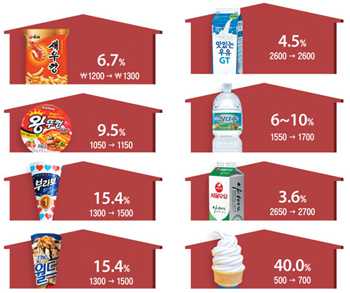Food Prices Rise Ahead of Minimum Wage Hike
17 November, 2018

Food and beverage manufacturers are raising their prices ahead of another minimum wage hike. The government raised the minimum wage 16.4 percent this year and it will rise another 10.9 percent next year.
Businesses are taking preemptive steps to cope with rising labor and raw material costs, which is causing a domino effect on the prices of restaurants across the country.
Processed food prices have been rising all year, including cookies and crackers, instant noodles, milk and microwaveable meals. In March, CJ Cheiljedang raised the prices of instant rice and canned ham by 6.4 to 9 percent, and on Thursday Nongshim increased the prices of 54 types of snacks by 6.7 percent. In other instances Nongshim reduced the volume of food products to cope with rising production costs.
Milk prices are also on the rise. In August, Seoul Dairy Cooperative raised the price of milk from W80 to W90 per liter, while Namyang Dairy raised them by 4.5 percent last month. This will push up the prices of products using milk like bread, coffee drinks and butter as well.
One staffer at a food manufacturer said, "The raw material cost has increased more than 10 percent compared to last year, so we can't stay in business without raising prices."
Manufacturers can keep product prices steady even though production costs rise as long as sales grow, but this is not an option during the current slump.
Prof. Sung Tae-yoon at Yonsei University said, "Businesses have no choice but to boost product prices to make up for the rising costs. But the rise in prices of everyday groceries is felt acutely by consumers."
Vegetables and meat are not an exception. The Korea Price Research Center tallied the prices of 15 kimchi ingredients, including napa cabbage and powdered red pepper, in six major supermarkets across the country and found that the total cost of making the staple side dish for a family of four rose 13.9 percent compared to last year to W352,750.
Buying the same ingredients in open-air farmer's markets is a bit cheaper, but they still cost W282,250, up 12.9 percent over the same period.
Restaurants are being forced to follow suit. Ediya Coffee, which operates around 2,600 outlets across the country, will raise the price of Americano from W2,800 to W3,200 a cup, and the prices of 14 out of its 70 products will rise an average 10 percent. Starting this month, fast food chain Lotteria raised the prices of all of its products by four percent.
The restaurant price index rose to 2.7 percent in the first 10 months of this year, up from 2.3 percent in the same period last year and the highest in seven years. The index tallies the prices of the 39 most popular restaurant food items including black bean noodles and kimchi stew.
The Korea Food Service Industry Association said restaurants are reflecting rising ingredient costs and minimum wage hikes in their prices. Suh Yong-gu at Sookmyung Women's University said, "Consumers will keep their wallets shut if disposable incomes remain unchanged while consumer prices rise. This will lead to a drastic slowdown in private consumption, triggering a vicious cycle."
TAG(s):
